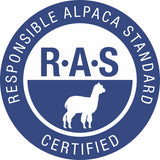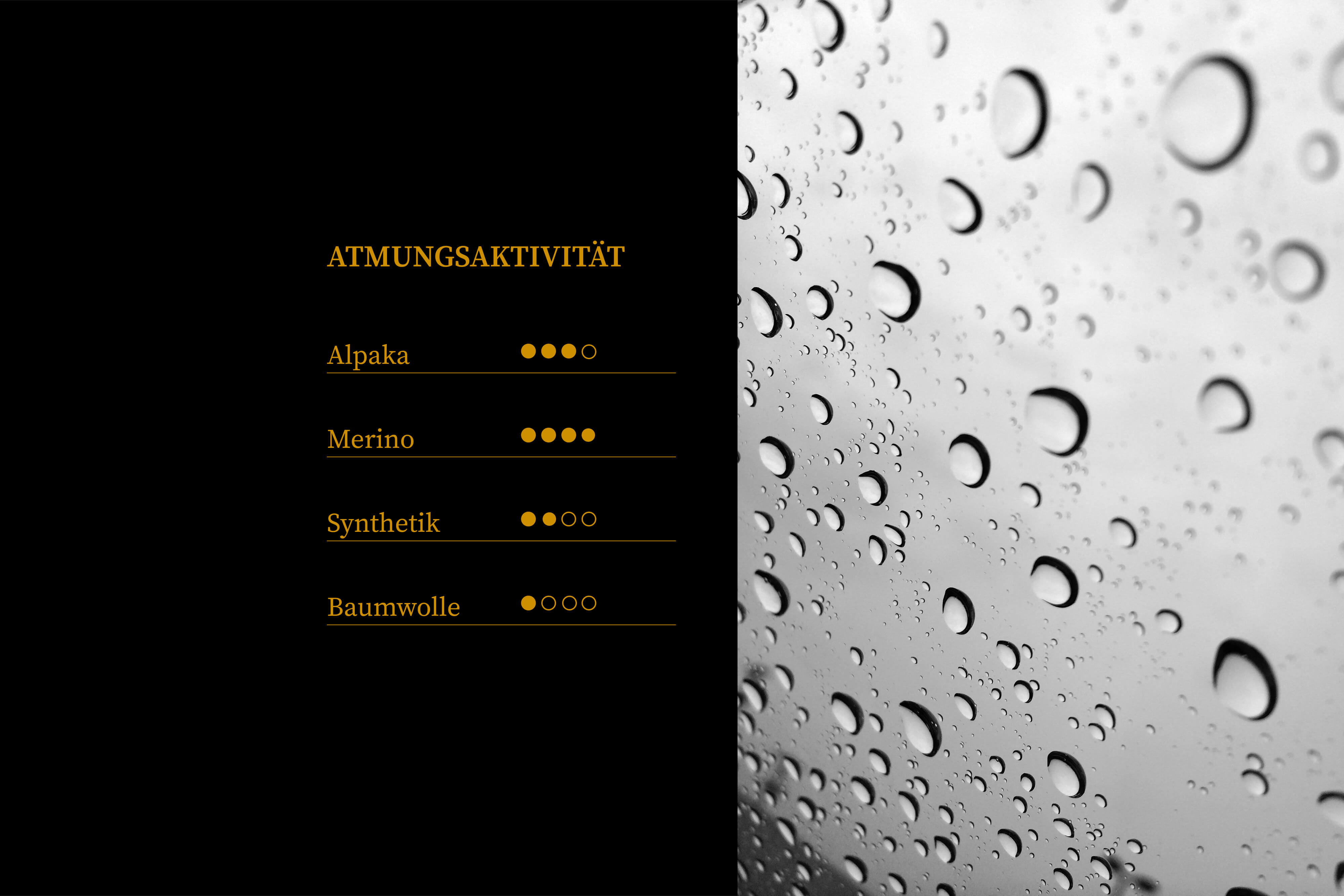

Shipping & Returns

WITHOUT HARMFUL SUBSTANCES
environmentally friendly production

ANIMAL WELFARE
in breeding & wool production

FAIR-TRADE
Fair pay & working conditions
Frequently asked questions about alpaca socks
Are alpaca socks warm?
Thick alpaca wool socks are the warmest socks. Alpaca wool has the highest thermal characteristics of all types of wool and is seven times warmer than sheep's wool. Thin alpaca socks are also suitable for spring, summer and autumn, thanks to the temperature regulation of the alpaca wool. This means that your alpaca socks adapt to the temperature so that your feet neither freeze nor sweat.
Do alpaca wool socks scratch?
Alpaca wool is available in five qualities that vary in their softness. Most alpaca socks are made from baby alpaca wool, the softest quality, for a gentle feel on the skin. Alpaca wool can be quite scratchy in the lower qualities of alpaca, fine and superfine, which is why we recommend that you always choose baby alpaca for textiles that are close to the skin. Alpaca wool of the highest baby alpaca quality is also suitable for allergy sufferers, including those who are allergic to wool.
Are alpaca or merino socks better?
Alpaca and Merino have similar properties and are both ideal for making high-quality socks. While alpaca wool offers better softness and warmth, Merino is more breathable. Why choose Merino or Alpaca socks when you can have both? The two types of wool complement each other perfectly, which is why many of our alpaca socks are mixed with Merino.
How do I recognize good alpaca socks?
Good alpaca socks can be recognized by an alpaca wool content of at least 40%. Only when there is enough alpaca wool can it really develop its warming characteristics. Our alpaca socks contain 50% of the softest baby alpaca wool and are mixed with nylon, elastane and often merino for more robustness and durability. 100 percent alpaca socks are cuddly soft, but also more sensitive, which is why they are more suitable for cozy evenings on the sofa at home.
Are alpaca socks also suitable for people who suffer from sweaty feet?
Thin socks made of alpaca wool are particularly suitable for sweaty feet, as the wool regulates heat, wicks moisture away and has natural antibacterial properties. Alpaca socks promise the perfect foot climate, without freezing or sweating. Merino, bamboo and synthetic materials can also be suitable for socks for sweaty feet. It is important to use breathable socks so that sweat is effectively wicked away.
How to wash alpaca socks?
Alpaca socks should always be mixed with nylon and elastane for greater robustness. They can be washed in the washing machine on the gentle wool program or by hand. You can wash alpaca socks less often with a clear conscience, as they air out well in the fresh air and hardly absorb any odors.
VERGLEICH
Materialien für Socken
Nicht jede Socke ist gleich. Material und Verarbeitung entscheiden über Komfort, Wärme und Funktionalität.



Mit dicken Alpaka Wollsocken nie mehr kalte Füße haben
Unsere dünnen Alpaka Strümpfe sind für den Alltag gedacht - in allen Jahreszeiten, da Alpakawolle die Temperatur reguliert und dir so immer ein angenehmes Fußklima beschert. Alpaka und Merino sind die besten natürlichen Materialien für atmungsaktive Socken. Merino ist dabei ein wenig atmungsaktiver als Alpaka, weshalb die beiden Wollarten sich auch in der Mischung ideal ergänzen. Auf welche Socken du bei kalten Füßen setzen solltest? Dicke Alpaka Wollsocken und Thermosocken, weil sie besonders flauschig sind und dich auch bei Minusgraden nicht im Stich lassen.
Für Menschen, denen es wichtig ist, dass Socken nicht einschneiden sowie für all diejenigen mit speziellen Bedürfnissen führen wir Diabetiker Socken aus Alpaka im Sortiment - ohne drückende Bündchen, dafür mit optimaler Passform und höchster Elastizität zur Unterstützung der Blutzirkulation.
Alpaca socks are comfortable and warm
Feet are the thermometer of the body and have a significant influence on our sense of warmth. Our feet move us throughout our lives and even if we see them less often, we don't want to neglect them. With alpaca socks you can take your comfort and well-being to the next level. They are indescribably comfortable, soft and also robust and easy in care. On the one hand they provide warmth and on the other hand they are breathable, so that your feet always feel good.
Alpaca wool is particularly suitable for socks due to its thermoregulating characteristics. Alpaca fibers have small cavities that ensure ideal heat balance at any temperature. They warm and store heat in cold weather and cool and insulate at higher temperatures. We have the extreme weather conditions in the Andes Mountains, where alpacas live, to thank for this. There, it is more common to experience all four seasons in a single day. Alpaca socks do not make you shiver, nor do they allow heat to build up. The hollow chambers of alpaca material act like an air conditioner for your feet in any weather.
Socks don't have to be boring. Our alpaca socks are a real eye-catcher and don't want to be hidden. Colorful or patterned, they bring Peruvian joy of life into your everyday life. With alpaca socks from Alpakin, women and men opt for incomparable softness and pleasantly warm feet all year round. Whether at work, in their free time or when traveling - with our alpaca socks you set accents and do good for your feet.


WARME FÜßE FÜR ALLE
Spare jetzt im Set.
Du erhältst 10% Rabatt ab 3 Paar Socken und ganze 15% ab 5 Paar aus unserer gesamten Kollektion.
Maximum comfort with alpaca socks
Alpaca socks may be more expensive than regular socks made of cotton or synthetic fibers, but alpaca wool has properties that no other material offers.

Warm & breathable
As the warmest wool in the world, alpaca is ideal for making socks to keep your feet warm. Alpaca socks keep you warm and retain heat, but are also breathable and ensure that your feet don't sweat. You can get the most warmth with wool socks or thermal socks made of alpaca wool, which are ideal for cold days. Thin alpaca socks, on the other hand, can also be worn in spring or summer, as their breathability makes comfortable alpaca socks functional at the same time. Alpaca wool wicks away moisture and thus prevents the formation of odors.

Functional & easy-care
Alpaca fibers are long and tear-resistant, which makes socks made of alpaca wool robust and hard-wearing. The material is therefore also ideal for hiking socks that are subject to greater wear and tear. Always pay attention to blends, as socks made of 100% baby alpaca are more sensitive. Alpaca wool is also the answer for socks that don't shed fluff. Alpaca socks need to be washed less often because they are dirt-repellent and hardly absorb any odors. They can be washed in the wool program of the washing machine and should not be put in the dryer.

Gentle on the skin
Baby alpaca, the softest alpaca wool, consists of fine fibers and is just as soft as cashmere. Soft socks made of alpaca wool contain hardly any lanolin (wool fat) and are therefore also suitable for allergy sufferers and people with neurodermatitis. Socks in cream, brown and black are the natural colors of alpacas. The wool is processed directly in these colors, completely without chemical coloring.
Sustainable
Alpaca fiber is a sustainable natural fiber that is produced in an environmentally friendly way. Alpacas are landscape-friendly animals that contribute to greening landscapes. They also require little water and grass and produce an above-average amount of wool, up to six kilograms per alpaca shearing.
Care tips
Washing alpaca socks
Alpaca wool is naturally dirt-repellent, robust and dries quickly. Airing out in the fresh air neutralizes odors, so you have to wash alpaca socks less often. When it's time to wash the socks, follow these care tips: They can be washed by hand or in the washing machine. Use a special wool detergent and do not add fabric softener or bleach. Select the gentle wool cycle and wash the alpaca socks at a maximum of 30 degrees Celsius and no more than 600 revolutions per minute. Allow the socks to air dry lying down and do not put them in the dryer to avoid pilling. When hand washing, also make sure the temperature is lukewarm and do not rub the socks too hard, as this can damage the fibers.























